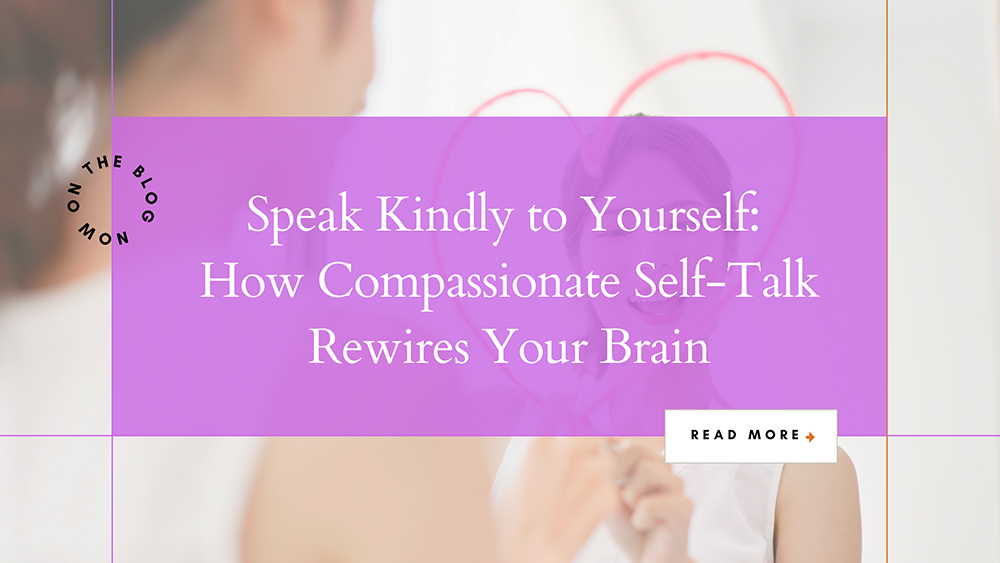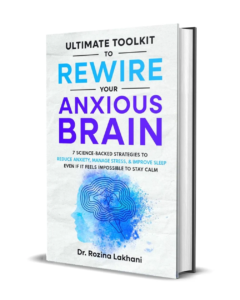
Have you ever caught yourself saying things to yourself that you’d never say to someone you love?
That sharp voice inside, the one that calls you “lazy,” “weak,” or “not enough” can feel impossible to silence. But here’s the truth: the way you talk to yourself shapes your mind, your emotions, and even your resilience. The good news? You can retrain that inner critic to become your inner coach.
This is one of the powerful practices I share in my upcoming book, The Ultimate Toolkit to Rewire Your Anxious Brain. The excerpt below, taken from Processing Technique #6: Speak Kindly to Yourself shows how compassionate self-talk can calm your inner critic and literally rewire your brain for peace and resilience.
The garage had gone quiet, wrapped in the hushed stillness of early evening. A single bulb cast a soft yellow glow overhead, and the only sounds were the slow ticking of an old wall clock and the gentle rustle of Sarah flipping pages in her notebook.
She stared down at a half-written sentence, then looked up. “Is there something I can do in the moment… when I mess up and my brain just blurts out, ‘I’m such an idiot’?”
Lisa set down her pen and leaned forward, her voice gentle. “That reaction—those harsh words—it’s not your fault. Somewhere along the way, your inner voice learned that criticism felt safer than compassion.”
Grandpa John gave a low whistle. “Maybe it’s time to teach it a new tune.”
When Anxiety Sounds Like a Critic
“If anxiety had a voice,” Lisa said, “it wouldn’t always sound like panic. Sometimes, it sounds like a bully.”
Sarah nodded. “Yeah. Mine says things like: You should’ve done better. You’re not strong enough. Everyone’s judging you.”
Uncle Joe added, “And if you hear that stuff enough times—even if it’s just in your own head—you start to believe it.”
Lisa continued, “Here’s the truth: you are not your inner critic. That voice was shaped by past experiences—maybe perfectionism, maybe old pain. But it doesn’t have to be the narrator of your life.”
Why It Works: Self-Talk and the Brain
Lisa drew a simple diagram in her notebook.
“Here’s what happens: Negative self-talk lights up the amygdala, triggering your stress response. Your body reacts as if someone else just insulted you.”
“But when you shift to compassionate thinking, you activate your prefrontal cortex—the rational, calming part of your brain. You lower cortisol, increase emotional regulation, and build resilience instead of reactivity.”
Sarah raised an eyebrow. “So being kind to myself actually rewires my brain?”
“Exactly,” Lisa said. “And that kindness becomes your anchor, especially when anxiety is loud.”
From Critic to Coach: Rewriting the Script
Lisa turned the page in her journal and wrote two side-by-side phrases.
“Imagine you’re the screenwriter of your life,” she said. “Would you let the main character’s inner monologue sound like a bully—or like a wise, steady friend?”
Then she offered examples:
- From: “I messed everything up.”
To: “I made a mistake, but I’m learning.” - From: “I’m not strong enough to handle this.”
To: “This is hard, but I’ve done hard things before.” - From: “Everyone else has it together.”
To: “Everyone struggles sometimes. I’m not alone.”
Lisa looked up. “This is more than positive thinking. It’s about choosing a voice that supports you—not sabotages you.”
Try This: The Inner Ally Exercise
Lisa handed Sarah a small blank card.
“Write a message to yourself,” she said softly. “As if you were writing to your best friend. Right after a tough day.”
Sarah blinked. “That sounds easy… but also weirdly hard.”
Grandpa John chuckled. “That’s how you know it’s worth doing.”
Uncle Joe added, “Took me years to speak to myself the way I’d speak to someone I love. But once I started, it changed everything.”
Lisa nodded. “It doesn’t matter whether you write it, whisper it, or stick it on your bathroom mirror. The key is repetition. That’s what makes it real to your brain.”
She offered a few prompts:
- What would I say to a friend who felt like this?
- What tone would I use with someone I care about?
- How can I give myself that same kindness?
Why Compassion Isn’t Weak
Lisa paused. “Let’s clear something up. Self-compassion isn’t about letting yourself off the hook or avoiding accountability.
It’s about creating safety—the kind of safety where growth actually happens.”
She smiled and added, “Research by Dr. Kristin Neff shows that people who practice self-compassion are more motivated, less anxious, and more resilient. Because when you’re not fighting yourself, you can focus on what really matters.”
Sarah took a deep breath, tracing her finger along the edge of the card she’d just written.
“I’m doing the best I can. That’s enough for today.”
She smiled—just a little—and tucked the note into her journal.
Lisa met her eyes. “That voice? That’s the one we’re growing now.”
Want a Simple Way to Practice This?
Take a moment to listen to the 3-minute Self-Compassion Meditation, a calming guided audio designed to help you shift from self-judgment to self-kindness. It’s a gentle way to reset your inner dialogue, especially on the tough days.
👉 Listen now https://bit.ly/RAB-SelfCompassionMeditation
Changing the way you speak to yourself isn’t easy, but it’s one of the most powerful steps toward healing anxiety and building resilience. Each time you choose compassion over criticism, you rewire your brain to respond with calm, strength, and clarity.
What you just read is a glimpse from my upcoming book, The Ultimate Toolkit to Rewire Your Anxious Brain. Inside, you’ll find more step-by-step tools like this one – practical strategies you can start using right away to break free from anxiety’s grip.
Want to be part of the journey? Join my Early Reader Team today and get exclusive access before anyone else. Your feedback will help shape this book and bring hope to more people who need it.
Get Your Free Advance Copy and Join the Early Reader Team Here: https://happyandhealthymind.com/anxietybook-signup


